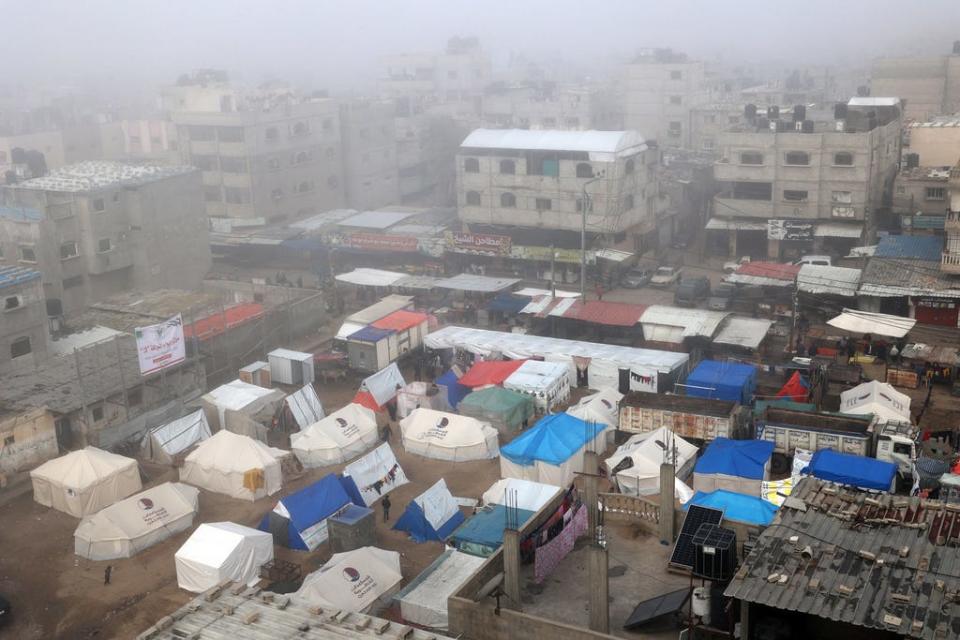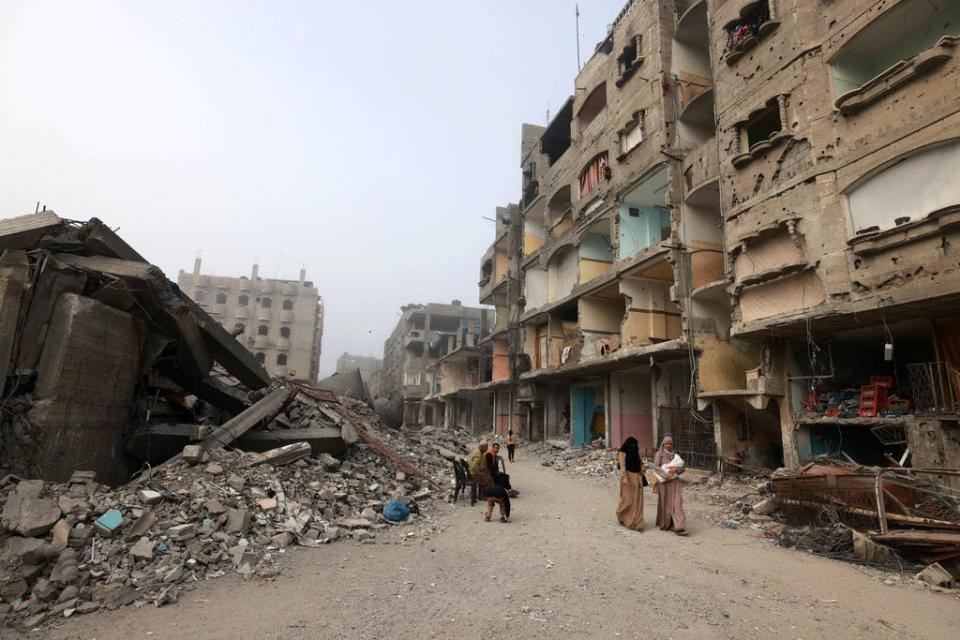Israeli plan for Rafah civilians unclear to US; hostage deal advances: Updates
- Oops!Something went wrong.Please try again later.
Editor's Note: This page is a summary of news on the Israel-Hamas war for Sunday, Feb. 25. For the latest news on the conflict in the Middle East, view our live updates file on the war for Monday, Feb. 26.
Prime Minister Benjamin Netanyahu says Israel is in sync with the U.S. about its plan to invade Rafah, the densely populated city in southern Gaza, but President Joe Biden had yet to see a viable plan for the imminent operation, a top White House official said Sunday.
National Security Adviser Jake Sullivan said the White House had not seen the Israeli plan to evacuate the more than 1 million people packed near the Egyptian border.
"We’ve been clear that we do not believe that a major military operation should proceed in Rafah unless there’s a clear and executable plan to protect those civilians, to get them to safety and to feed, clothe and house them," Sullivan said during an appearance on NBC’s “Meet the Press.” “And we have not seen a plan like that.”
Netanyahu said Sunday his government and U.S. officials agree a plan for Rafah must include a mass evacuation. His office said the military has presented the War Cabinet a plan for the Rafah invasion and for evacuating civilians.
"We’re on the same page with the U.S. on this, because that’s how we do it," he said on CBS’s "Face the Nation." Netanyahu said he would be shown a "dual plan" in a meeting with his general staff on Sunday. He did not directly address whether Israel would show the plan to U.S. officials before it heads to the War Cabinet.
Netanyahu maintains invading Rafah is necessary to complete Israel’s objective of destroying Hamas. Negotiations for a temporary cease-fire and release of hostages have made progress in recent days, but Netanyahu said an agreement would only delay the incursion into Rafah.
"If we have a deal, it’ll be delayed somewhat but it’ll happen," Netanyahu said. "If we don’t have a deal, we’ll do it anyway. It has to be done, because total victory is our goal, and total victory is within reach. Not months away, weeks away once we begin the operation."
Humanitarian aid organizations, including U.N. groups, have warned that military operations in the overcrowded city would be devastating.

Developments:
∎ Health care in overcrowded Rafah is so limited that at Emirates Hospital three or four newborns have to share incubators meant for only one and, according to Dr. Amal Ismail, two to three newborns die in a single shift. Before the war, one or two newborns in incubators died at the facility per month.
∎ More than 29,600 Palestinians, mostly women and children, have died in the war, according to the Hamas-run Gaza Health Ministry. The ministry does not differentiate between combatant and civilian deaths.
∎ The Israeli military said Sunday it had "concluded" its operations in Nasser Hospital, where it arrested 200 suspected militants and "found boxes of sealed medicine with the names of Israeli hostages in addition to large quantities of weapons." Health officials said Israeli snipers shot people trying to flee the complex and multiple patients died when a power outage cut off their oxygen supply.
∎ The Health Ministry described the conditions in northern Gaza as "catastrophic," saying a lack of fuel has forced several hospitals to cease operations. "Dialysis and intensive care patients are at risk of death as a result of the lack of fuel for the generator, ambulances and medicines," the ministry said, adding that dozens of vehicles used for medical services are not working.

Progress made on temporary cease-fire deal
Representatives from the U.S., Egypt and Qatar have made progress on a diplomatic agreement for a temporary cease-fire and the release of hostages in Gaza, according to statements from top Israeli officials and Israeli media reports.
Mediators met in Paris over the weekend after negotiations broke down earlier this month when Netanyahu vehemently opposed Hamas' demands for Israel to pull its forces out of Gaza and release thousands of Palestinians from Israeli prisons in exchange for the hostages.
On Sunday, the Israeli War Cabinet met to discuss a deal proposed in Paris that would secure the release of dozens of hostages. Officials estimate there are more than 100 living captives in Gaza, in addition to the remains of about 30 others. While there's been no official word on any decisions, several Israeli media outlets said negotiators continued discussions in Doha, Qatar, where Israel is sending a delegation Monday, and may later move on to Cairo.
On Sunday, Netanyahu said Israel and the mediators are "all working on" a deal.
"I want it because we want to liberate the remaining hostages," he said. "And I appreciate the effort, the combined effort of Israel, the United States, to bring back the remaining hostages. I can't tell you if we'll have it. But if Hamas goes down from its delusional claims ... then we'll have the progress that we all want."
Top Israeli officials have said if no agreement is reached, the military will invade Rafah by the beginning of the Muslim holy month of Ramadan, which starts around March 10. More than 1 million people, most of whom have fled from other areas of the territory, are crowded in overflowing shelters and sprawling tent encampments in Rafah with little food, water and medicine.
Up to 40 hostages would be released under proposed deal
Some details about the possible agreement are trickling out and they include a six-week cease-fire and the release of up to 40 women and older hostages in exchange for up to 300 Palestinian prisoners, mostly women, minors and older people, according to an Egyptian official who requested anonymity.
As part of the deal, the influx of trucks bringing humanitarian aid into Gaza, including the north, would increase to hundreds a day, after slowing down to an average of about 65 in recent weeks. In addition, negotiations for a permanent cease-fire and more hostage releases would continue during the truce.
Air Force member sets himself on fire at Israeli embassy in DC, has critical injuries
An active-duty U.S. Air Force member set himself on fire outside the Israeli embassy in Washington on Sunday afternoon, according to authorities.
The man was transported to an area hospital with critical, life-threatening injuries. Local and federal officials declined to say whether the incident was a form of protest.
But a person who spoke to the Associated Press on condition of anonymity said the man, whose name wasn’t immediately released, live-streamed himself on the video streaming platform Twitch. At one point, the man said he "will no longer be complicit in genocide" and shouted "Free Palestine," according to the AP and other media reports.
The Washington Fire and Emergency Medical Services officials and the U.S. Secret Service responded to the embassy call. The flames were extinguished by the time Fire and EMS personnel reached the embassy at approximately 1 p.m., public information officer Vito Maggiolo said.
Cease-fire wouldn't stop hostilities vs. Hezbollah, official says
Hezbollah may stop firing projectiles across the border if Israel reaches a cease-fire deal with Hamas, but the Iran-backed militant group shouldn't expect reciprocity, a top Israeli official said Sunday.
Defense Minister Yoav Gallant said Israel intends to keep up its airstrike-and-artillery campaign on Hezbollah, based north of Israel in Lebanon, until it can guarantee its citizens' safety. About 80,000 residents of northern Israel have been displaced by Hezbollah attacks that began right after the war ignited. Israel wants to push the militants away from the border, be it through diplomatic agreement or by force, Gallant said.
“We will continue the fire, and we will do so independently from the south, until we achieve our goals,” he said.
Hezbollah leader Hassan Nasrallah has said the group would stop hostilities in southern Lebanon if a cease-fire were reached in Gaza, but would resume and step up attacks if Israel continued to strike in Lebanon after an agreement with Hamas.
Contributing: Thao Nguyen, USA TODAY; Associated Press
This article originally appeared on USA TODAY: Israel Hamas updates: Israeli plan for Rafah civilians unclear to US

